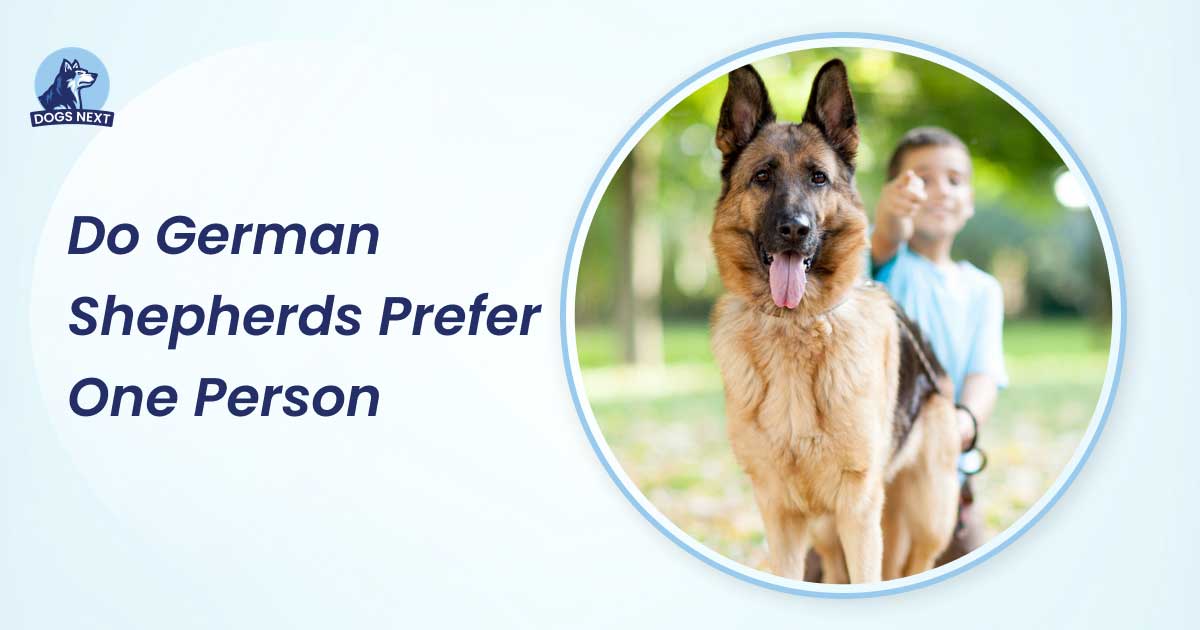Yes, German Shepherds often prefer one person. They form strong bonds with their primary caregiver.
This trait makes them loyal and protective. German Shepherds are known for their intelligence and loyalty. These dogs often develop a deep connection with one person. This bond is usually with the person who spends the most time with them.
It could be the one who feeds, trains, or plays with them the most. This preference does not mean they won’t be friendly with others. They can still be loving and affectionate to the whole family. Understanding this trait can help in training and socializing your German Shepherd. It ensures they are well-adjusted and happy pets.
Tendency To Bond Closely
German Shepherds are known for their loyalty and protective nature. Many owners observe that their German Shepherds form strong bonds, often preferring one person over others. This tendency to bond closely can be a charming yet complex behavior. Understanding these attachment patterns in GSDs helps create a harmonious relationship between pet and owner.
Strong Attachments To One Primary Caregiver
German Shepherds often form strong attachments to one primary caregiver. This behavior, known as dog attachment behavior, is common among many breeds but is particularly notable in GSDs. Several factors contribute to this bonding tendency:
- Consistency: German Shepherds thrive on routine and predictability. The person who consistently feeds, walks, and trains them often becomes their favorite.
- Trust: Building trust through positive reinforcement and gentle handling is crucial. GSDs are more likely to bond with someone who respects their boundaries and shows patience.
- Time spent together: The amount of quality time spent with a German Shepherd significantly influences their attachment. Engaging in activities like playtime, training sessions, and walks strengthens their bond.
These strong attachments can be beneficial, ensuring the dog feels secure and loved. This bond also aids in training, as the dog is more likely to respond to commands from their primary caregiver. However, this attachment can sometimes lead to separation anxiety if the dog is left alone for extended periods.
Who Provides The Most Care And Attention
The person who provides the most care and attention often becomes the favorite in a German Shepherd’s eyes. This is a natural outcome of German Shepherd bonding. Here are some key aspects:
- Feeding: Regularly feeding the dog creates a positive association. The dog sees this person as a provider, enhancing their bond.
- Exercise: GSDs need regular physical activity. The person who ensures they get enough exercise becomes crucial in their eyes.
- Training: Training sessions are essential for mental stimulation. The person involved in these sessions often earns the dog’s respect and trust.
- Affection: Dogs need love and cuddles. The person who provides affection and attention will naturally become closer to the dog.
In a household with multiple members, it’s common to see the German Shepherd showing preference towards the one who meets their needs most consistently. This preference is a direct result of the dog’s attachment behavior and should be seen as a positive indication of the bond formed.
Understanding these attachment patterns in GSDs can help all household members contribute to the dog’s well-being. It ensures the dog feels secure and maintains a healthy relationship with everyone.
Factors That Influence Bonding
German Shepherds, often known for their loyalty and intelligence, may sometimes appear to favor one person over others. This behavior can be linked to various factors that influence bonding. Understanding these factors can help in building a strong relationship with your German Shepherd Dog (GSD).
Time Spent Training And Socializing The Dog
The amount of time you spend training and socializing your German Shepherd significantly impacts their bonding tendencies. Consistent interaction fosters a deeper connection between you and your dog. Here are some key points to consider:
- Regular Training Sessions: Engaging in daily training sessions enhances communication and trust. Commands, tricks, and obedience training can make your GSD more attuned to your presence.
- GSD Socialization: Exposing your dog to different environments, people, and other animals can help them become well-adjusted and less anxious. Socialization reduces fear and strengthens the bond.
- Quality Time: Spending quality time playing, walking, or simply being together strengthens your connection. Activities like fetch, tug-of-war, or hiking can build a positive relationship.
| Activity | Frequency | Impact on Bonding |
|---|---|---|
| Training Sessions | Daily | High |
| Socialization | Weekly | Moderate |
| Quality Time | Daily | High |
Investing time in these activities will enhance your dog’s attachment to you. This strong bond is one of the factors affecting dog bonding, ensuring your GSD feels secure and loved.
Individual Dog Personality And Experiences
Each German Shepherd has a unique personality and history that shapes their bonding tendencies. Understanding these aspects can help in nurturing a strong relationship. Consider the following:
- Temperament: Some GSDs are naturally more affectionate and attached, while others may be independent. Recognizing your dog’s personality helps in tailoring your approach.
- Past Experiences: A dog’s past experiences can influence their attachment. Dogs that have faced neglect or trauma might take longer to bond. Patience and consistent positive reinforcement can help.
- GSD Bonding Tendencies: German Shepherds are known for their loyalty. They tend to form strong bonds with those who provide consistent care and attention.
The following table outlines how personality and experiences affect bonding:
| Factor | Impact on Bonding |
|---|---|
| Affectionate Temperament | High |
| Independent Temperament | Moderate |
| Positive Past Experiences | High |
| Negative Past Experiences | Low |
Recognizing and respecting your dog’s personality and past experiences is crucial. This understanding is key in determining what affects dog attachment and helps in building a lasting bond with your German Shepherd.
Ensuring They Socialize With All Family Members
German Shepherds are known for their loyalty and strong bond with their owners. But do they prefer one person over others? This often depends on how well they socialize with all family members. Ensuring your German Shepherd bonds with everyone in the household is crucial for a harmonious home environment. Let’s explore some effective strategies.
Encourage Other Family Members
Encouraging other family members to participate in your German Shepherd’s care and activities can help foster family bonds with dogs. Here are some dog socialization tips that can be beneficial:
- Daily Walks: Assign different family members to take your GSD for daily walks. This helps the dog become familiar with everyone.
- Playtime: Ensure each family member spends time playing with the dog. Use toys and games that the dog enjoys.
- Feeding: Rotate the feeding responsibilities among family members. This creates a positive association between the dog and each person.
Additionally, you can create a schedule to ensure everyone is involved:
| Family Member | Activity | Day |
|---|---|---|
| Parent | Morning Walk | Monday, Wednesday, Friday |
| Child 1 | Evening Playtime | Tuesday, Thursday |
| Child 2 | Feeding | Saturday, Sunday |
By involving everyone in these activities, your German Shepherd will learn to trust and bond with all family members.
Train To Respond To Commands From Everyone
Training your German Shepherd to respond to commands from everyone in the family is essential for family involvement in training. Here are some steps to ensure effective training:
- Consistency: Use the same commands and gestures across all family members. This prevents confusion for your dog.
- Patience: Training takes time. Encourage all family members to be patient and consistent.
- Rewards: Use treats and praise to reinforce positive behavior. Each family member should carry treats to reward the dog.
Consider holding regular family training sessions:
| Day | Training Activity |
|---|---|
| Monday | Basic Commands (Sit, Stay, Come) |
| Wednesday | Leash Training |
| Friday | Recall Training |
During these sessions, rotate who gives the commands. This ensures your German Shepherd learns to listen and respond to everyone. Training together also strengthens the bond between the dog and each family member.
These strategies on how to share GSD bonding will help your dog feel secure and loved by the entire family.
Frequently Asked Questions
Do German Shepherds Bond With One Person?
Yes, German Shepherds often form a close bond with one person. They are loyal and protective, making them great companions. This bond can be stronger if the person spends more time with the dog.
Are German Shepherds One-person Dogs?
German Shepherds can be one-person dogs due to their loyal nature. They may favor one individual, especially if that person trains and cares for them. However, they can still be friendly with other family members.
Why Do German Shepherds Favor One Person?
German Shepherds favor one person due to their strong loyalty and protective instincts. They tend to bond with the person who provides consistent care, training, and attention. This creates a strong, trusting relationship.
Can German Shepherds Bond With Multiple People?
Yes, German Shepherds can bond with multiple people. While they may have a favorite person, they are capable of forming relationships with other family members. Proper socialization and shared responsibilities help in bonding.
Conclusion
German Shepherds can form strong bonds with one person. They are loyal and protective. This breed thrives on companionship and trust. They can still be friendly with others. Each dog has its own personality. Some may prefer a single person.
Others may enjoy being with the whole family. Understanding your dog’s needs is key. Spend quality time together. Build a strong relationship. This ensures a happy and healthy German Shepherd.

I’m David, an expert contributor and writer, with two furry friends of my own, I know the challenges of raising and caring for dogs. From training to nutrition and health, my goal is to provide valuable insights and advice to help create strong bonds and happy, healthy lives. Find me in Twitter.



